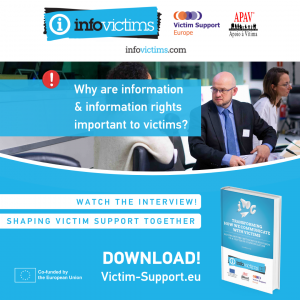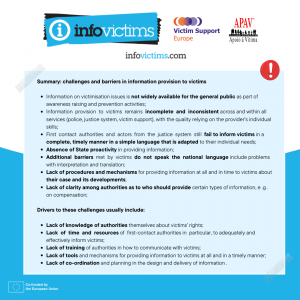
Victim Support Europe’s (VSE) Executive Director Levent Altan stated that while a new policy paper, developed under the INFOVICTIMS III project which is coordinated by the Portuguese Association for Victim Support (APAV), is ‘an excellent step towards bettering the lives of victims’, attitudes must change’.
Statements from European crime victims show that many still struggle to access and receive information that is both clear to understand and adapted to their needs, whether they are looking for assistance immediately after the crime or during criminal proceedings.
“I got this letter [from the court] and I went there but I didn’t understand, so I asked. ‘You should know what you are here for. Read the letter and decide what you want to do. Whether you want to sign or not.’ And I was like, I don’t know. […] ‘You should know.’ And I signed it. [The court clerk explained] nothing, nothing, he said nothing.” (Victim, Portugal)[1]
Victims often experience loss, injury, and trauma following a crime. However, if they are not offered information on how to access support or justice or if they are given inappropriate, inadequate or overly complex information, there is a high risk that they will experience additional distress or trauma, which may lead victims to feel excluded from the justice system.
In 2012, the EU Victims’ Rights Directive established a clear set of rights on the provision of information to victims of crime; these rights include – among others – the right to receive information about their case, and to access translation and interpretation services.
However, despite the progress made, victims still find it difficult to access or receive information they can understand and act upon. VSE’s preliminary findings from the BENEVICT project[2], which examined the implementation of the Victims’ Rights Directive across the 27 EU Member States, indicates that, as of 2023, “even though the obligation to provide all these instances of information is brought forth in the national legislation of almost all Member States, victims do not receive full information or receive information that is not comprehensible”.
 VSE’s Levent Altan has hailed as “an excellent step” the new policy paper which offers practical guidance, to governments and stakeholders working with victims, on ensuring information is properly communicated to victims.
VSE’s Levent Altan has hailed as “an excellent step” the new policy paper which offers practical guidance, to governments and stakeholders working with victims, on ensuring information is properly communicated to victims.
“Information is at the heart of both safe justice and effective support for victims of crime. It allows victims access services and legal restitution and helps prevent secondary victimisation. While some progress has been made over the recent past, we can see that current mechanisms for information provision do not work and fail to address the needs of victims. This means that a shift in how we approach and implement information rights is needed”, confessed Altan. “The challenges observed prevent victims from effectively understanding, and acting on, the information given to them. We must move beyond simply providing information, to truly communicating with victims”.
This new policy paper aims to examine these challenges and look at effective solutions. Its recommendations include the provision of guidelines, for professionals and others, on communicating with those who have fallen victim to crime; the development of practical solutions, e.g. online platforms which allow victims access information about their case; and the development of a systemic approach to information provision, through use of a communication framework.
 Frederico Marques, from the Portuguese Association for Victim Support (APAV), which coordinated the INFOVICTIMS III project, said: “We must change people’s attitudes and ways of thinking. The provision of information to victims is often seen as an obligation, an administrative burden, and its impact on victims, their recovery and their participation in proceedings is often underestimated. Approaching information rights from a communications perspective allows us to focus on information being understood by the victims, information which must be processed and then used. This shift in thinking is imperative, if we want to achieve better access to support and justice systems.”
Frederico Marques, from the Portuguese Association for Victim Support (APAV), which coordinated the INFOVICTIMS III project, said: “We must change people’s attitudes and ways of thinking. The provision of information to victims is often seen as an obligation, an administrative burden, and its impact on victims, their recovery and their participation in proceedings is often underestimated. Approaching information rights from a communications perspective allows us to focus on information being understood by the victims, information which must be processed and then used. This shift in thinking is imperative, if we want to achieve better access to support and justice systems.”
While our justice systems have taken years to evolve, criminal proceedings are still perceived as being complex and unfamiliar, often leaving victims feeling excluded from a process that impacts their lives and their experiences.
“Many things I didn’t know before, such as […] about compensation, having a look at the case file, a lawyer. So, I would have definitely wished for more information on these things.” (Victim, Germany)[3]
To achieve effective change, information provision must be integrated within a broader communication system which focuses on how and whether information is understood, which defines what information should be shared with victims, how and by whom, which establishes quality standards as well as a framework and mechanisms to ensure its coordination.
“Many police officers, and members of other authorities working with victims, do their best to inform and support victims of crime. The problem is that the quality of the information depends on the individual delivering it, on their training, their ability to communicate and their sensitivity to victims’ issues. This results in a fragmented system which delivers inconsistent information and offers an unequal service to victims, depending on where they are or who they talk to.” admits Altan.
Altan stressed the importance of integrating a communication framework within a broader National framework for comprehensive victim support that could coordinate the actions and responses of different sectors that play a role in victims’ recovery.
He said: “Now that the paper ‘Transforming how we communicate with victims’ is published, VSE’s priority will be to make our recommendations a reality. A first step is to make sure that the European Commission publishes the revised Victims’ Rights Directive, with stronger information rights for victims and related obligations for Member States, as soon as possible.
We must work with national governments and other organisations to ensure they understand our recommendations and implement them. While alterations to the law are fundamental to life, a greater shift is needed to transform ‘on the ground’ practices and to help those implementing them; to change the lives of victims.”
[1] EU FRA, Proceedings that do justice, Justice for victims of violent crimes, part II, 2019
[2] More information on the project available on VSE’s website: https://victim-support.eu/what-we-do/our-projects/ongoing/benevict/
[3] EU FRA, Proceedings that do justice, Justice for victims of violent crimes, part II, 2019

